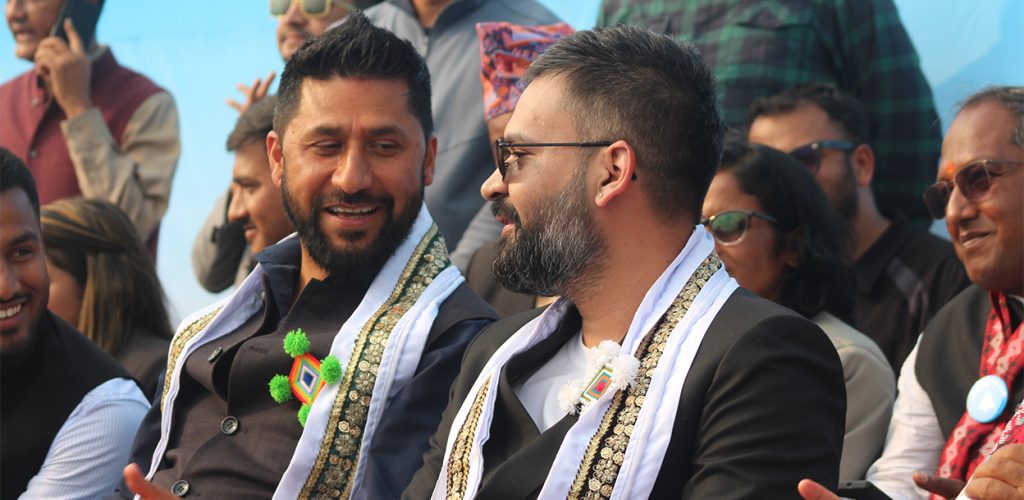
Whenever the concepts of disability and womanhood intersect, they often result in the marginalisation of women with disabilities. These women face double discrimination as they are not only subjected to gender-based violence but also to social exclusion and discrimination due to their disabilities.
The intersection of gender and disability, therefore, leads to the marginalisation of women with disabilities, who experience social exclusion and violence in the discriminatory social landscape of Nepal.
Despite being entitled to basic services such as education, healthcare, communication and reproductive health services, they are often denied these rights due to their status as women with disabilities. Reproductive health services, which are critical for the physical and emotional well-being of women, are even more inaccessible to women with disabilities due to social stigma, lack of awareness, and lack of affordability and accessibility.
The barriers in the physical realm
Sexual and reproductive health encompasses the physical, emotional, mental and social well-being of an individual in regard to their sexuality and reproductive capabilities. Women with disabilities often face numerous barriers when it comes to accessing these critical health services.
These barriers include a lack of education and awareness about the importance of sexual and reproductive health for women with disabilities, negative attitudes from healthcare providers who may discriminate against them and a lack of physical accessibility to health facilities.
This lack of accessibility could mean that the facilities are not equipped to accommodate individuals with disabilities, hindering their ability to receive necessary treatments and services. Moreover, the lack of affordable and accessible reproductive health services often results in women with disabilities being denied basic human rights, such as the right to control their own bodies and make informed decisions about their reproductive health.
This highlights the need for more comprehensive programmes, campaigns and measures to be implemented to support and empower women with disabilities in their pursuit of sexual and reproductive health and rights.
Unfortunately, the discrimination and marginalisation faced by women with disabilities extend to access to sexual and reproductive health services. Take for instance, a woman with a disability seeking a safe abortion mostly face negative attitudes from healthcare providers such as doctors and nurses, who often judge her and deny her access to the services she needs.
This exclusion is also seen in the case of women with multiple disabilities who are being vaccinated on a monthly basis to control menstruation and pregnancy. These women are not only subjected to physical abuse such as life-threatening rape but also to emotional abuse in the form of verbal harassment and discrimination.
They are often asked questions that perpetuate the myth that they are not entitled to basic sexual and reproductive health services simply because they are disabled. The lack of understanding and awareness around the needs of women with disabilities, combined with negative attitudes from healthcare providers, creates barriers that prevent women with disabilities from accessing the essential sexual and reproductive health services they are entitled to.
Digital disturbances
In recent years, the emergence of digital platforms has had a profound impact on various aspects of human life, including the provision of sexual and reproductive health services. However, for women with disabilities, accessing basic sexual and reproductive health services on digital platforms has become more complicated, creating several divisions in terms of their ability to fully utilise the services provided.
Accessibility is one of the main challenges faced by women with disabilities when it comes to digital platforms. Many platforms are not designed to be accessible for people with visual, hearing, or physical impairments, which limits their ability to use them effectively.
In addition, the information available on sexual and reproductive health on digital platforms is often not adapted to the needs of women with disabilities, making it difficult for them to access relevant information and services.
Negative attitudes and stigma towards women with disabilities continue to exist in the digital world. This often leads to discrimination and harassment, which directly limits their access to sexual and reproductive health information and services. Additionally, the lack of privacy and confidentiality on digital platforms is a major concern for women with disabilities as they may not have full control over who has access to their personal information.
Overcoming the barriers
To address these challenges, it is essential to develop accessible digital platforms or adapt existing ones to meet the needs of women with disabilities. It is also crucial to provide accurate and relevant information in accessible formats and to train healthcare and service providers to be more sensitive and knowledgeable about the needs and rights of women with disabilities.
Additionally, promoting online spaces that are free from discrimination and harassment, along with ensuring privacy and confidentiality for women with disabilities in digital platforms, can go a long way in ensuring equal access to sexual and reproductive health information and services for women with disabilities in the digital world.
The denial of reproductive health services to women with disabilities is a form of discrimination and a violation of their human rights. To overcome this, it is important to take a multi-faceted approach, focusing on different areas to ensure that women with disabilities are treated equally and have access to the same services as their non-disabled counterparts.
Moreover, there are various ways to improve the situation, such as:
•Awareness and sensitisation campaigns: Creating awareness about the importance of reproductive health services and the rights of women with disabilities can help to reduce the social stigma surrounding disability and promote equality.
•Accessible healthcare facilities: Making healthcare facilities accessible and accommodating to women with disabilities can help ensure that they receive the necessary services and treatments.
•Affordability: Providing financial assistance to women with disabilities can help make reproductive health services more accessible and affordable.
•Counselling: Providing counselling services to women with disabilities can help to reduce anxiety and increase the chances of a successful outcome.
•Training of healthcare providers: Training healthcare providers to become more sensitive and knowledgeable about the needs and rights of women with disabilities can help to reduce negative attitudes and improve the quality of care they receive.
•Equal access to information: Providing equal access to information about reproductive health services and options to women with disabilities, through accessible communication and media, can help to empower them and ensure that they are able to make informed decisions.
•Providing inclusive information: Digital platforms should provide information on sexual and reproductive health that is inclusive of women with disabilities. This can include information on accessible contraceptives, fertility options, and sexual health education.
•Offering support: Digital platforms can provide support for women with disabilities through online forums, counselling services, and online support groups. These platforms can also provide resources on where to find specialised healthcare providers and disability-friendly healthcare services.
•Ensuring privacy and confidentiality: Women with disabilities may face stigma and discrimination when it comes to their sexual and reproductive health. Digital platforms should ensure the privacy and confidentiality of their users to create a safe and supportive environment.
•Collaboration with organisations of persons with disabilities: Collaborating with organisations that represent people with disabilities can help increase awareness and ensure that the needs of women with disabilities are properly addressed.
Health and well-being are basic rights for all human beings, regardless of their sexual and physical orientation. It is imperative to recognise that women with disabilities require additional support and care due to the challenges they face.
Denying them access to basic health care services, including reproductive health services, is a serious violation of their human rights. There must be a concerted effort from all stakeholders, including governments, health organisations, civil society and the private sector, to create a world where women with disabilities are not only able to access reproductive health services but also lead fulfilling lives in a world free from stigma, discrimination and violence.
By working together, we can ensure that women with disabilities can exercise their basic human right to health and well-being with dignity and respect.




















